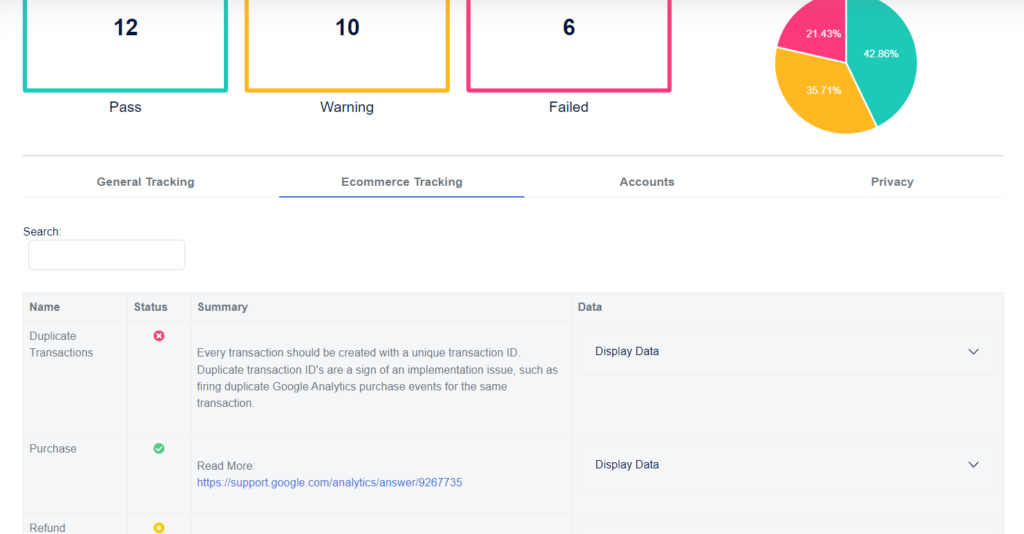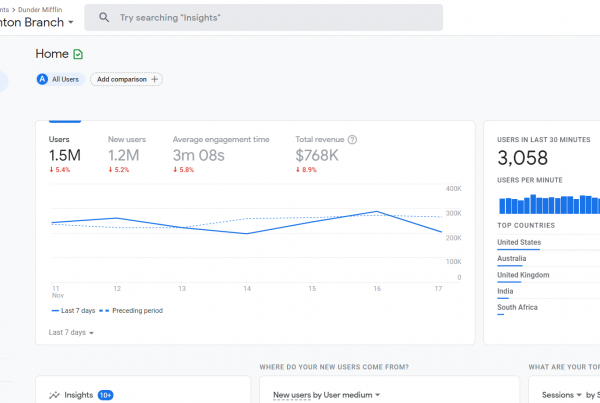
We live in a world where data is crucial to success. Within business, we gain intelligence from our marketing analytics, which provide the data required to craft effective strategies.
Expertise in this area is sought after, and marketing analytics consultants are in high demand. They can effectively analyze marketing data and gain a clear insight into your business.
Most business owners look at their marketing analytics, but without experience, it’s hard to know if it’s accurate, or how to use this data. Are you taking appropriate actions as a result?
Here are some scenarios you may have faced.
First scenario
Your sales team is struggling to convert customers and close sales. They blame it on the marketing team’s inability to produce quality leads.
The marketing says they are delivering the right potential clients and that the sales team is the problem.
How can you identify where the issue is so you can work towards a solution?
Second scenario
You’ve had all your graphics and visuals done by high-quality, professional creatives. Despite your investment, your conversion rate is still suffering. You need to identify the problem as your advertising budget is getting drained.
Do you need to reassess the quality of your creative team, or is your marketing budget not being correctly utilized for the best results?
Third scenario
Have you overdone it on analytics platforms and have more reports than you know what to do with? Sometimes too much data can be overwhelming and disorganized.
With all this information, you may not understand how to compile it in a user-friendly way. On top of that, you’ll need to identify which insights are useful to your business so you can focus on them.
In all these scenarios, there are only two ways forward. You’ll either make the wrong decision and end up throwing away money or figure out what the issue is and correctly identify the solution for positive outcomes.
You can ask your team members for their opinions and have as many meetings as you want, but unfortunately, that’s not how you’re going to get results.
Numbers don’t lie, and neither do trends, technology, and buyer habits. Technology is continuously progressing and your customers with it. Your business needs to keep up or risk getting left behind.
What Can A Marketing Analytics Consultant Do for You?
You’ll need more than automation platforms and advanced technology to benefit from your collected data fully. These technologies provide all the data you need to know but do not give you actionable steps. For that, you’ll need to analyze the data and create strategies for improving your marketing efforts.
You need an expert, and many businesses do not have access to qualified people within their staff. The data will need analyzing, but most importantly, you’ll need to report those crucial insights obtained from the information.
For this reason, a data analyst alone will not be able to offer robust marketing strategies to improve your figures. For this, you’ll need a marketing consultant.
They can cover the duties of a data analyst while using their expertise in marketing to provide you with actionable steps to success. Marketing analytics consultants can provide a ton of value to your business.
Here are a few of the functions of a consultant and the tasks they perform for you.
Create a marketing strategy to set you up for success
The first thing your consultant will do is review your marketing analytics and how you currently present and review them. From there, they can begin creating a strategy for your platforms based on what they’ve found. Simplifying your analytics will lead to more organization and streamlining the flow of your work.
A marketing analytics consultant will build this plan by doing the following:
- Investigating all current sources of data and identifying what your marketing team needs. Then they can create a more efficient process for collecting, analyzing, and extracting insights.
- Have a look through all your unorganized data sources and compile them with your already structured information. Choosing the most relevant and beneficial platforms to collect and record this information in a user-friendly way.
- Find the areas where you lack strategy and missing vital information.
- Build a bespoke analytics strategy for your business.
- Implement action points based on data insights.
While Facebook Insights and Google Analytics are great tools for capturing data, they cannot give you answers. They report specific pieces of data, and you cannot customize these reports or create anything bespoke for your business. It’s more desirable to develop an individual strategy for reporting data and not entirely rely on the platforms alone.
You’ll want to base your report around essential questions that will help you optimize your marketing, such as what you’re going to do to boost your ROI. You require more than just the numbers to answer these questions.
Repair the holes in your current information insights
Are your current analytics capturing the full volume of data that is available to you? Is the time frame of the data relevant to your business?
When you’re capturing tons of irrelevant data, it can be extremely overwhelming and confusing. It’s unnecessary to do this and will end with you making incorrect assumptions.You’re better off with fewer data sources that are relevant and accurate than every data source out there, with information you can’t even use.
Working with a marketing analytics consultant can help you patch up the holes in the data sources and simplify the information. They will use your data to create a strategy that answers questions you have about your marketing.
The insights are there; you just need to understand them properly. You can compare it to putting together a puzzle. You’ve got all the pieces; you just need someone to come in and put them all together, allowing you to see the big picture.
Identifying which figures and numbers are essential, and which are irrelevant is what a consultant does best. Concerning optimizing your insights, you can expect them to complete the following tasks.
- They thoroughly inspect all current reports and identify what vital information is missing from the data. It will include correlations between various sources of data, the function of each platform’s dashboard and usability, and the automation of reporting.
They will also look at the time frame of detailed data and what additional metrics you require to deliver a well-rounded assessment
- Create goals and tangible objectives for future reports. These will dictate what changes you should make to report more accurate and usable data.
Some metrics they will look at will be brand awareness, performance, consumer behavior, transactions, and return-on-investment. All these categories need accurate data to allow your marketing efforts to be most effective.
- Use tried and tested strategic models as a blueprint to redefine your processes. These will increase your client retention, bring value to your brand, and help to anticipate future trends.
- Work alongside your current marketing team to help them understand how to use data insights.It will include showing them how to take information from the data platforms and use it to make highly relevant stories.
- Build a bespoke marketing strategy for your business that fills the gaps in your current system, streamlining the process, and efficiently allocating budget. It will help you to stop spending your valuable marketing budget on unnecessary efforts.
The insights gained, and questions answered are of higher importance than a bank of data. Work with a marketing analytics consultant who will focus on quality rather than quantity.
Assess Your Marketing Strategy from an Outside Perspective
Sometimes, your management team is not able to solve every problem within your business. Many scenarios can hold them back from making individual decisions, and many times, it’s themselves that are at fault. It’s not to say they are unqualified, but problems and issues relating to marketing analytics are not everyone’s forte.
Rather than come to inaccurate assumptions, it’s often better to get an outside perspective on the topic from someone skilled in the niche.
- Marketing consultants work with many different clients in a variety of types of businesses. They’ve seen many problems before, and they will likely see the same ones again. Your issues may be similar to past clients they’ve worked with, and therefore they will know many ways to fix the problem.
Their experience dealing with confusing metrics and data can make your life much more comfortable.
Most consultants can look at the issues in your analytics strategies and immediately see what’s working correctly and what you can improve.
- An analytics consultant loves analytics. They see them every day and are always coming up with new and innovative strategic ideas that can benefit your business.
They can offer you informed advice about marketing technologies that you’ve probably never considered. A good consultant will cut your budget in half by eliminating excess spend on strategies that aren’t working.
They will also save you time and resources.
- They drive the focus on low performing areas and holes in your analytics strategy. It can help dissolve conflict within your team as you’ll be able to identify which sector is struggling with their KPIs, rather than all the “he-said-she-said.”
So not only can you gain insights into your web performance, but also your teams’ performance as well.
- It’s not all about the negatives. A consultant will also highlight where you are excelling, including data insights that are working well and which teams are high performers.
If there are serious issues, you can address them immediately. It can drive focus to nurture those areas that are running well and model the rest after them.
All businesses have different policies and regulations that dictate how much power each sector has. Some teams may not have the authority to implement changes without consulting with someone higher up, or not consider presenting new ideas.
Having someone external come in can be the driving force to make significant changes without the formalities.
Help and Educate Your Team
A marketing analytics consultant has many different roles and functions, but one of the most important is to educate. It’s no use to implement strategies when no one on your team knows how to use them.
Investing in in-depth training programs is very expensive, not to mention time-consuming. It’s also costly to employ additional staff who have extensive knowledge of analytics.
A consultant will build effective strategies but also educate your team on how to gain insights and implement them in your marketing.
- Consultants will restructure your marketing team, ensuring they are operating efficiently. They can identify training needs and make sure that the team is up to date on new technologies and platforms.
You may be able to avoid needing additional staff as well since the consultant will automate a large number of your analysis procedures. You’ll receive a thorough analysis without needing a staff member to do it for you.
- Your team can gain a ton of knowledge from a marketing analysis consultant, building their confidence, and giving them a skill boost.
With new and progressive analysis technology entering the scene, fewer people have expertise in marketing analysis. While you’ll likely find data analysts, they won’t specialize in marketing.
Working with a consultant who specializes in marketing will dramatically impact your strategies, delivering informed, positive results for your business.
They understand how to approach data and use insights to drive positive outcomes tactically. Simplify your company and have access to the gamut of relevant data needed to make yours into a high-performing, high-converting empire.
Free Google Analytics Audits
We partner with Optimo Analytics to get free and automated Google Analytics audits to find issues or areas of improvement in you GA property.




